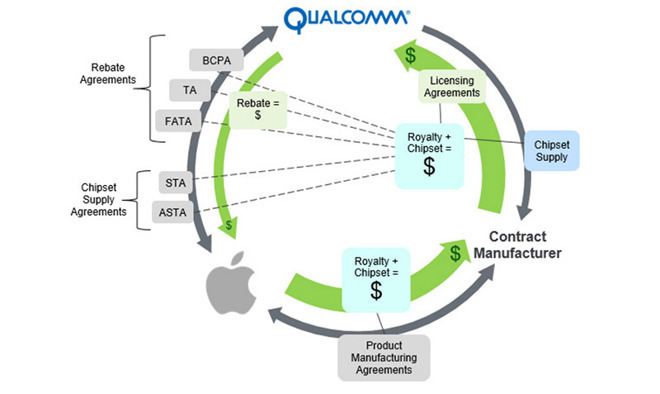Responding to some of the harsh claims in Apple's more than $1 billion lawsuit, chipmaker Qualcomm has issued a statement of its own saying the allegations are "baseless" and accusing Apple of provoking "regulatory attacks" in the U.S. and South Korea.
"While we are still in the process of reviewing the complaint in detail, it is quite clear that Apple's claims are baseless," Qualcomm executive VP and general counsel Don Rosenberg said in a press release. "Apple has intentionally mischaracterized our agreements and negotiations, as well as the enormity and value of the technology we have invented, contributed and shared with all mobile device makers through our licensing program."
Apple has been "actively encouraging" investigations by the likes of the U.S. Federal Trade Commission and the Korean Fair Trade Commission, Rosenberg suggested, "by misrepresenting facts and withholding information." In late December, the KFTC concluded its investigation by issuing the company a $853 million fine, accusing it not only of bundling chip orders and licensing deals but being too restrictive with licensing in general, while simultaneously avoiding payments for patents held by others.
"We welcome the opportunity to have these meritless claims heard in court where we will be entitled to full discovery of Apple's practices and a robust examination of the merits," Rosenberg concluded.
On filing its lawsuit on Friday, Apple accused Qualcomm of exploiting its "monopoly power" to dodge FRAND (fair, reasonable and nondiscriminatory) patent commitments, for instance charging "extortion-level" rates for standards-essential patents. Above all, it suggested that Qualcomm withheld rebates as retaliation for it cooperating with enforcement agencies, and even tried to get Apple to lie to the KFTC in exchange for releasing money.
Both Apple and the FTC have claimed that Qualcomm forced Apple into an exclusive chip supply deal between 2011 and 2016, making that the condition of rebates.
The iPhone 7, released last September, is Apple's first iPhone model to use two LTE modem suppliers, the second being Intel.
 Roger Fingas
Roger Fingas








 Malcolm Owen
Malcolm Owen
 Marko Zivkovic
Marko Zivkovic
 Christine McKee
Christine McKee
 Andrew Orr
Andrew Orr
 Andrew O'Hara
Andrew O'Hara
 William Gallagher
William Gallagher

 Mike Wuerthele
Mike Wuerthele




-m.jpg)



21 Comments
THIS is their response?
Qualcomm is in deep doodoo.
Apple gave factual data on where Qualcomm went wrong-withholding a specific amount of money owed-out of spite.
Qualcomm then spins a web to connect all their woes to Apple.
When that hat is the best they can do, you already know who stands where.
Its going to to end poorly for Qualcomm.
Where there is smoke there is fire. apple would not sue unless there is a clear breach of contract or their intellectual property.
FTC find Qualcomm in error. Apple sues Qualcomm for money owed. Apple gets attacked and slandered. Business as usual.
It sounds like a great novel, but reported n the news earlier is Apple is throttling the speeds on Apple phones featuring Qualcomm Chips. In addition to that, I happen to know several people that switched to Verizon because the iPhone 7 with intel chips performed poorly; and would drop calls in areas iPhone 6S didn't. This sounds like a better product which is likely protected by patented ideas or design. Qualcomm can justify it's price it's a better performing product just like a car manufacturer can charge more for a design that is faster. What we know for a fact is that Apple wants $1,000,000,000.00. Could they actually be forecasting a $1B loss in company value or sales..? We all know that Apple doesn't release products with a lower price point. When my iPhone 6 Plus (with a Quallcomm chip) started wigging out, and turning off when it had a 30% charge, I just decided to get a new battery because Qualcomm chips are better when talking to my friends.